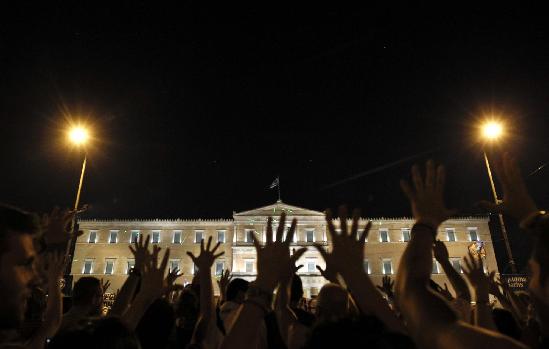Global General
Greece in crisis; Europe wrangles over aid
(Agencies)
Updated: 2011-06-20 09:21
 |
Large Medium Small |
|
|
ATHENS/LUXEMBOURG - Prime Minister George Papandreou asked Greeks on Sunday to support austerity steps and avoid a "catastrophic" default, as European finance ministers discussed extending tens of billions of euros of aid to Athens.
Addressing the Greek parliament, Papandreou appealed for the nation to accept deeply unpopular tax hikes, spending cuts and privatisation plans which international donors have demanded as a condition for the aid.
"The consequences of a violent bankruptcy or exit from the euro would be immediately catastrophic for households, the banks and the country's credibility," Papandreou said at the start of a confidence debate on his new crisis cabinet.
Greek officials have said the country will face default in mid-July if the European Union and the International Monetary Fund do not hand over a 12 billion euro tranche of emergency loans by then.
Euro zone finance ministers began a two-day meeting in Luxembourg on Sunday evening to decide whether to disburse that tranche, part of a 110 billion euro ($156 billion) bailout of Greece launched in May last year. They will also discuss proposals for a second bailout that could be worth some 120 billion euros and keep Greece funded through 2014.
Spain's economy minister told reporters on the sidelines of the meeting that ministers hoped to reach agreement on Sunday night on disbursement of all of the next loan tranche to Greece.
"We're still discussing... We hope (to have a deal). That's why we are here tonight," Elena Salgado said.
The finance minister of Germany, where political opposition to spending taxpayers' money on bailing out Greece has been rising, was more equivocal.
"We will work today and tomorrow so that we get as far as possible," Wolfgang Schaeuble said. "Greece must fulfill all the necessary preconditions so that it can be paid out on time. Europe will do its part."
Opposition leader Antonis Samaras demanded in parliament that Papandreou quit to pave the way for early elections and a renegotiation of the terms of Greece's current bailout.
Greece, with a public debt worth more than 150 percent of its annual economic output and rising, missed debt targets in its initial bailout plan partly because of a deep recession.
In the proposed new bailout scheme, private investors would for the first time share the burden, pledging to maintain their exposure to Greece by voluntarily buying about 30 billion euros of sovereign bonds as their current holdings matured.
| 分享按钮 |
